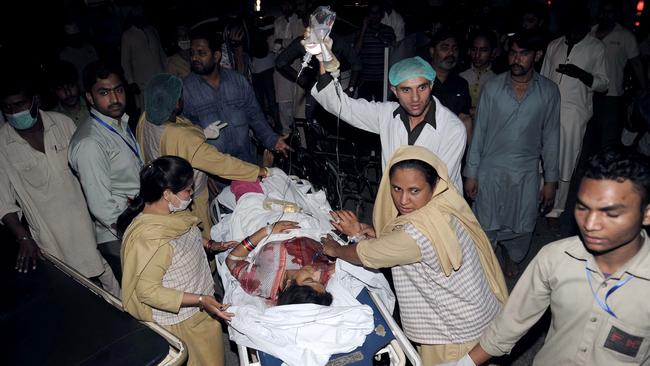
Scores of Christians celebrating Easter — many of them women and children — were slaughtered in a suicide bombing in Lahore carried out by a faction of the Pakistani Taliban on Easter Sunday.
The bomb went off next to a children’s playground and left more than 400 wounded.
Dozens of survivors screamed and wailed among pools of blood as they waited for assistance after the blasts.
The attack chimes uncannily with last Tuesday’s terror bombings in Brussels, which were also planned originally to take place on Easter Sunday.
It seems certain the arrest on March 18 of Salah Abdeslam averted a full week of terror planned for Europe, designed to start on Easter Sunday and involve larger and more numerous attacks than the Brussels bombings, which killed 35 people and wounded 300.
Three key features tie the Lahore and Brussels attacks together — the anti-Christian sectarianism, the danger of a nuclear dimension in future terror attacks and the inspirations of Islamic State.
The Pakistani Taliban has a hatred of all religious minorities — including Shia, Hindus, Christians and anyone else who does not share its extremist ideology.
At the same time as these bombings took place, 10,000 demonstrators had gathered in Islamabad to protest against the execution of Mumtaz Qadri.
He had been hanged in Rawalpindi at the end of February for assassinating Punjab governor Salman Taseer, in 2011. Qadri had been Taseer’s bodyguard. Taseer’s offence was to question the severity of Pakistan’s anti-blasphemy laws, especially the death sentence passed on a Christian woman after an argument with her Muslim neighbours.
The blasphemy laws have been a brutal weapon against religious minorities, especially at the village level. Members of minority religions, especially Christians, can be accused of some crime of disrespect towards Islam and then be prosecuted by the state or harassed or even murdered by mobs.
The faction of the Pakistani Taliban that claimed responsibility for the Lahore bombings, Jamaat-ul-Ahrar, has a history of anti-Christian attacks, as well as attacks on other religious and ethnic minorities.
At one point it broke from the Pakistani Taliban, the TTP, and declared its loyalty to Islamic State, but later said it had rejoined the Pakistani Taliban.
ISIS claimed responsibility for the Brussels attacks and has been the inspiration, if not always the direct organiser, of most of the recent terrorism in Europe.
The Afghan Taliban is widely believed to be supported by the Pakistani military but the Pakistani Taliban targets the Pakistani state and religious minorities.
Nonetheless both branches are dominated by ethnic Pashtuns, do not act against each other and offer sanctuary to each other’s members.
The world faces three large, successful and growing terrorist groups, ISIS, al-Qa’ida and the Taliban, plus a host of smaller or territorially limited groups across much of the Muslim world. Belgian and French police have established the Brussels terrorists had made significant preparations for an attack on the nation’s main nuclear reactor. Terrorists had filmed the daily routine of one of the plant’s main scientists, a security guard was found assassinated and authorities have stripped the entry rights of several workers.
Belgian authorities believe the group planned to steal radioactive material from the plant to create a dirty bomb. Such a bomb, if deployed correctly, could kill hundreds of people and render parts of a city permanently uninhabitable.
The French, Belgian and Pakistani attacks ought surely to end the argument about whether terrorism is an existential threat to the West.
The threat may not be existential in that it does not threaten the entire physical existence of the West, but it is existential in that it threatens physical and social damage of a scale unseen in the West since World War II.
ISIS and al-Qa’ida have long had the ambition of acquiring nuclear material. So far, Western intelligence has stopped them. That’s good news. But the Belgian and French terror outrages indicate not merely the growing threat of lone-wolf attacks, but the presence and growth of networks of terrorism with sophisticated capabilities, mainly involving veterans of Syria and Iraq.
The odds must be that one of these groups will one day make some sort of successful effort against a nuclear facility.
The growth of encryption technology will make it harder for Western intelligence and police to maintain their success rate over the last decade and a half.
The Pakistani attacks are relevant because nowhere else in the world are nuclear weapons more insecure or more likely to fall into terrorist hands.
The 2011 terror attack on the naval base in Karachi, which involved the Pakistani Taliban and al-Qa’ida, demonstrated a degree of jihadi infiltration of the Pakistani officer class which no one had imagined.
Recently the Pakistanis have developed a short-range tactical nuclear missile, the Nasr, which they have taken to transporting by truck. It would only need the hijacking of one such truck by one of the Taliban groups and the terrorists have a nuclear weapon.
The Nasr is much more prone to this than strategic weapons because the bigger weapons are normally kept in a disassembled state, with warhead, weapon and delivery system stored separately.
The point of a tactical nuclear weapon is that it is moved around to where it is likely to be needed, and kept more or less ready to go.
The possible consequences of terrorists acquiring such weapons are unimaginable as it is not beyond the realms of possibility that such a weapon could be moved around by the terrorists.
ISIS is losing territory in Iraq and Syria but still controls big cities and large swathes of both countries. The Taliban has sway over large parts of southern Afghanistan. Libya is in chaos with jihadists in control of chunks of territory.
The territorial reverses of ISIS are important, but there is no indication that they will lead to the demise of the organisation, or its ideology, or its sectarian hatreds, or its nuclear ambitions.
All that together certainly does constitute an existential threat.





